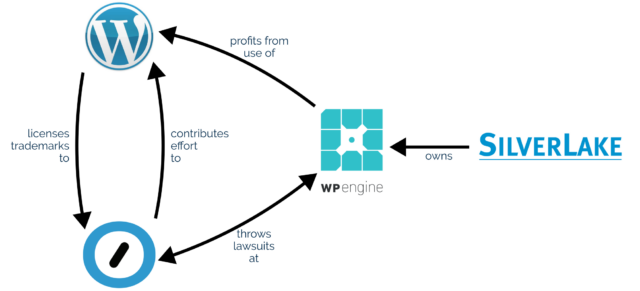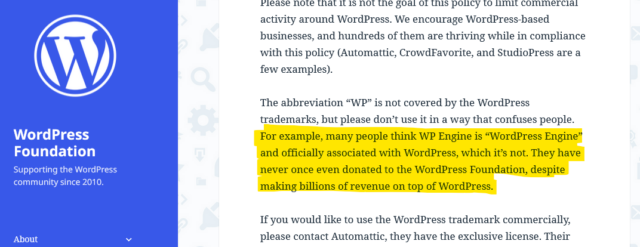If you’re active in the WordPress space you’re probably aware that there’s a lot of drama going on right now between (a) WordPress hosting company WP Engine, (b) WordPress hosting company (among quite a few other things) Automattic1, and (c) the WordPress Foundation.
If you’re not aware then, well: do a search across the tech news media to see the latest: any summary I could give you would be out-of-date by the time you read it anyway!

A declaration of war?
Like others, I’m not sure that the way Matt publicly called-out WP Engine at WCUS was the most-productive way to progress a discussion2.
In particular, I think a lot of the conversation that he kicked off conflates three different aspects of WP Engine’s misbehaviour. That muddies the waters when it comes to having a reasoned conversation about the issue3.

I don’t think WP Engine is a particularly good company, and I personally wouldn’t use them for WordPress hosting. That’s not a new opinion for me: I wouldn’t have used them last year or the year before, or the year before that either. And I broadly agree with what I think Matt tried to say, although not necessarily with the way he said it or the platform he chose to say it upon.
Misdeeds
As I see it, WP Engine’s potential misdeeds fall into three distinct categories: moral, ethical4, and legal.
Morally: don’t take without giving back
Matt observes that since WP Engine’s acquisition by huge tech-company-investor Silver Lake, WP Engine have made enormous profits from selling WordPress hosting as a service (and nothing else) while making minimal to no contributions back to the open source platform that they depend upon.
If true, and it appears to be, this would violate the principle of reciprocity. If you benefit from somebody else’s effort (and you’re able to) you’re morally-obliged to at least offer to give back in a manner commensurate to your relative level of resources.

Abuse of this principle is… sadly not-uncommon in business. Or in tech. Or in the world in general. A lightweight example might be the many millions of profitable companies that host atop the Apache HTTP Server without donating a penny to the Apache Foundation. A heavier (and legally-backed) example might be Trump Social’s implementation being based on a modified version of Mastodon’s code: Mastodon’s license requires that their changes are shared publicly… but they don’t do until they’re sent threatening letters reminding them of their obligations.
I feel like it’s fair game to call out companies that act amorally, and encourage people to boycott them, so long as you do so without “punching down”.
Ethically: don’t exploit open source’s liberties as weaknesses
WP Engine also stand accused of altering the open source code that they host in ways that maximise their profit, to the detriment of both their customers and the original authors of that code5.
It’s well established, for example, that WP Engine disable the “revisions” feature of WordPress6. Personally, I don’t feel like this is as big a deal as Matt makes out that it is (I certainly wouldn’t go as far as saying “WP Engine is not WordPress”): it’s pretty commonplace for large hosting companies to tweak the open source software that they host to better fit their architecture and business model.
But I agree that it does make WordPress as-provided by WP Engine significantly less good than would be expected from virtually any other host (most of which, by the way, provide much better value-for-money at any price point).

Again, I think this is fair game to call out, even if it’s not something that anybody has a right to enforce legally. On which note…
Legally: trademarks have value, don’t steal them
Automattic Inc. has a recognised trademark on WooCommerce, and is the custodian of the WordPress Foundation’s trademark on WordPress. WP Engine are accused of unauthorised use of these trademarks.
Obviously, this is the part of the story you’re going to see the most news media about, because there’s reasonable odds it’ll end up in front of a judge at some point. There’s a good chance that such a case might revolve around WP Engine’s willingness (and encouragement?) to allow their business to be called “WordPress Engine” and to capitalise on any confusion that causes.

I’m not going to weigh in on the specifics of the legal case: I Am Not A Lawyer and all that. Naturally I agree with the underlying principle that one should not be allowed to profit off another’s intellectual property, but I’ll leave discussion on whether or not that’s what WP Engine are doing as a conversation for folks with more legal-smarts than I. I’ve certainly known people be confused by WP Engine’s name and branding, though, and think that they must be some kind of “officially-licensed” WordPress host: it happens.
If you’re following all of this drama as it unfolds… just remember to check your sources. There’s a lot of FUD floating around on the Internet right now9.
In summary…
With a reminder that I’m sharing my own opinion here and not that of my employer, here’s my thoughts on the recent WP Engine drama:
- WP Engine certainly act in ways that are unethical and immoral and antithetical to the spirit of open source, and those are just a subset of the reasons that I wouldn’t use them as a WordPress host.
- Matt Mullenweg calling them out at WordCamp US doesn’t get his point across as well as I think he hoped it might, and probably won’t win him any popularity contests.
- I’m not qualified to weigh in on whether or not WP Engine have violated the WordPress Foundation’s trademarks, but I suspect that they’ve benefitted from widespread confusion about their status.
Footnotes
1 I suppose I ought to point out that Automattic is my employer, in case you didn’t know, and point out that my opinions don’t necessarily represent theirs, etc. I’ve been involved with WordPress as an open source project for about four times as long as I’ve had any connection to Automattic, though, and don’t always agree with them, so I’d hope that it’s a given that I’m speaking my own mind!
2 Though like Manu, I don’t think that means that Matt should take the corresponding blog post down: I’m a digital preservationist, as might be evidenced by the unrepresentative-of-me and frankly embarrassing things in the 25-year archives of this blog!
3 Fortunately the documents that the lawyers for both sides have been writing are much clearer and more-specific, but that’s what you pay lawyers for, right?
4 There’s a huge amount of debate about the difference between morality and ethics, but I’m using the definition that means that morality is based on what a social animal might be expected to decide for themselves is right, think e.g. the Golden Rule etc., whereas ethics is the code of conduct expected within a particular community. Take stealing, for example, which covers the spectrum: that you shouldn’t deprive somebody else of something they need, is a moral issue; that we as a society deem such behaviour worthy of exclusion is an ethical one; meanwhile the action of incarcerating burglars is part of our legal framework.
5 Not that nobody’s immune to making ethical mistakes. Not me, not you, not anybody else. I remember when, back in 2005, Matt fucked up by injecting ads into WordPress (which at that point didn’t have a reliable source of funding). But he did the right thing by backpedalling, undoing the harm, and apologising publicly and profusely.
6 WP Engine claim that they disable revisions for performance reasons, but that’s clearly bullshit: it’s pretty obvious to me that this is about making hosting cheaper. Enabling revisions doesn’t have a performance impact on a properly-configured multisite hosting system, and I know this from personal experience of running such things. But it does have a significant impact on how much space you need to allocate to your users, which has cost implications at scale.
7 As an aside: if a court does rule that WP Engine is infringing upon WordPress trademarks and they want a new company name to give their service a fresh start, they’re welcome to TurdPress.
8 I’d argue that it is okay to do so for personal-use though: the difference for me comes when you’re making a profit off of it. It’s interesting to find these edge-cases in my own thinking!
9 A typical Reddit thread is about 25% lies-and-bullshit; but you can double that for a typical thread talking about this topic!
I’m sorry to say it but I don’t really agree with the moral or ethical points you make. This presents a very narrow view of what you think giving back is. If we are going to get hung up on the 5% then how can MM praise Google in one breath and condemn WP Engine in the next breath. WP Engine is no less “moral” or “ethical” than Google is. Please. 🤦
I entirely agree with you that WP Engine is no more moral or ethical than Google. Based on their ethics alone, I try to use neither.
(I didn’t mention Google in my post because it didn’t seem relevant, but you’re right that Matt mentioned them in his talk: yet another way in which the waters were muddied!)
I think it is not about the total size of the company, it is about the part that makes money out of WordPress.
again WP Engine gives back in many other ways this is fact. Also, WTF they were a major sponsor of WCUS and how is that not giving back. The narrow view is looking at some not accurately track number of sponsored hours. That metric is flawed by design and only proves to make Automattic looks good.
Also, my point is that Google is no more moral or ethical than WP Engine is. Don’t be fooled.
also, this shit that @photomatt is pulling is affecting my day job, my clients and putting my livelihood at risk. That is on him and not WP Engine. Sending threatening text messages to strong arm someone to do your bidding is not how the world works and just shows how much of a dictator you are.
Why take it out on ME, a simple mom and pop WooCommerce store on WPEngine. I don’t give a crap about camps and the ethics of open source. I disabled the news thing ages ago with a few lines in functions.php Have I “hacked” WordPress? I don’t think so. I didn’t even know who Matt was until last night. All of you can take a flying for all I care today, I’m so angry. I had things to do, but now I’m doing THIS stupid shit.
The good news is that my website is fine so far.
I’m really sorry to hear that your website’s been caught up in this drama. It didn’t seem relevant to what I was saying earlier, but my personal opinion is that:
(a) it was wrong of WP Engine to disable the news feed for all their customers, and
(b) it was more-wrong of WordPress.org to make it hard for WP Engine customers to get automatic updates
However, I’ll be the first to admit that I’m less well-informed on both of those developments than I am on other issues, and I could be judging both prematurely.
Your boss is not okay. What’s the next best shopping cart to WooCommerce, never mind I found something—ANYTHING—to switch to.
“WP Engine certainly act in ways that are unethical and antithetical to the spirit of open source”
PHP has entered the chat
care to elaborate? I’d like to know more about what you mean.
in the short term, depending on your needs, you might as well go with Shopify.
something like this, probably https://mastodon.org.uk/@rbairwell/113197889634650503
Yep. Not only that, but if you want to make an argument about companies using open source and not contributing back, then that list of companies is extremely long, so trying to apply this standard of “ethical behavior” to a single company using open source is absurd.
So many companies use PHP and never contribute money or time to its development. What if PHP decided to block their access to its download servers?
aside: companies have to stop saying they sponsor or donate to WP and leave it at that. They have to keep going down the chain. Sponsor/donate to PHP. Great! Also sponsor/donate to as many packages that you rely on from composer or NPM. Too many? Shift your donations around periodically to other packages, even if you retain focus on a critical one. Spread it out!
I’m curious where Automattic falls with this? They apparently donate to PHP. You mentioned NPM and packages, and looking at all of the tooling involved with WordPress and Block building do they also support those avenues?
I think what I just still can’t let go of is how Matt praised Google but some how WP Engine is evil. Google does a lot of bad things. This just doesn’t send a very good message. 😕
unfortunately A8C does not publish a complete list of projects they donate to or sponsor so I’m unsure.
but it’s a huge point. Gutenberg components rely on a lot of stuff!
It’s refreshing to hear a nuanced take on the situation. Glad I found this video.
I had a vague inkling that you were at Automattic, and this is the exact post I was looking for. It’s useful to understand your perspective, though I don’t agree with some of it.
Maybe to add to the drama (or maybe to root it in reality), I have seen a noticeable change in our business enquiries this week from large organisations who are deeply spooked by this. The main theme is they don’t know who to trust, and their route out is replatforming away from the WP ecosystem altogether. I’m surprised that the adults haven’t yet stepped in to curtail what Matt Mullenweg is saying in public; some of which is very damaging, or at least adding fuel to the mistrust.
I hope you’re doing well Dan :) Sending my warmest wishes.
Great to hear from you, man!
Yeah: the optics on how Matt’s presented a lot of this stuff is… not always great. It’s a bit of a shame, really, because having seen a lot of the documents that back-up his claims that there were negotiations between WP Engine and Automattic and that these had broken down and stalled for a long (despite his efforts to bring them back to the table) long before the WCUS thing. It’s good that some of those documents are getting publicly summarised now.
But even if the context had been there, the WPUS Q&A looked pretty awful, didn’t it? I admit that my first thought upon seeing it was that Matt was acting like a bully! It took until I dug deeper before I could see the bigger picture. So yeah: real bad optics.